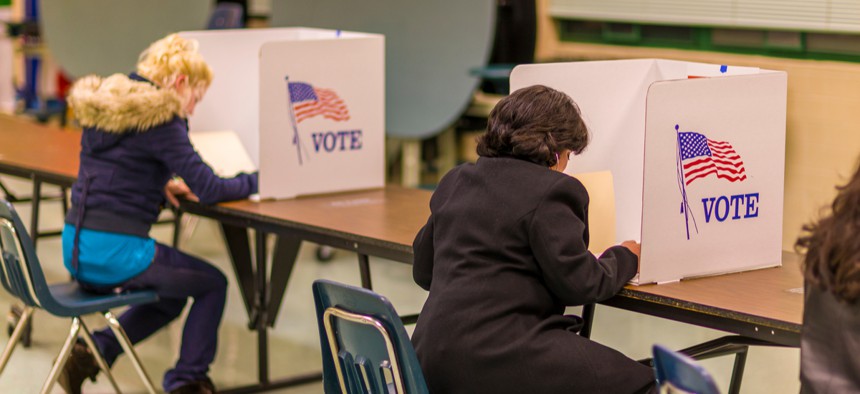Southern States Have Shuttered 1,200 Polling Places Since 2013

STATE AND LOCAL ROUNDUP | States brace for Trump clean-water-regulation rollback … Michigan teacher pay stagnates … Alaska’s summer of warning-bell warming.
Southern states in the U.S. have shuttered nearly 1,200 polling places since 2013, the year the Supreme Court struck down sections of the 1965 Voting Rights Act and released states with clear histories of racial discrimination from federal oversight of their election administration policies and practices, according to a recently published report by the Leadership Conference Education Fund, a civil rights group established in the 1950s. Texas leads the list of 13 states with 750 polling place closures, or 1 in 10 voting locations statewide. Arizona placed second with 320 polling places closed. The report authors argue that the closures can act as another way to disenfranchise specific groups of voters. “Closing polling places has a cascading effect, leading to long lines at other polling places, transportation hurdles, denial of language assistance and other forms of in-person help, and mass confusion about where eligible voters may cast their ballot,” the report reads. Maricopa County in Arizona closed the greatest number of polling places, followed by six counties in Texas: Dallas lost 74 places; Travis, 67; Harris, 52; Brazoria and Nueces, 37 apiece. Many of the counties that made the list are home to high percentages of minority voters. Beth Stevens, director of the Voting Rights Program at the Texas Civil Rights Project, said the report shows how the burden of monitoring elections practices in the places most likely to discriminate against minorities has now been left to the people formerly protected by the Voting Rights Act. The report also notes, however, that the closures come alongside other changes in election administration that make it easier and more convenient to vote—these changes include mail voting, and the establishment of ballot drop-off locations and centralized voting centers that serve multiple precincts. [Reuters, Houston Chronicle, Texas Observer, AZCentral]
CLEAN WATER | The Trump administration will repeal a major 2015 clean water regulation that has limited the ways chemicals can be used near water sources and wetlands. The rollback will take effect in approximately a week. It is part of the administration’s efforts to remove restrictions on sources of pollution. The move seems designed to curtail future efforts to regulate water pollution by narrowing the definition of the kinds of bodies of water the government will be allowed to safeguard. [New York Times]
TEACHER PAY | Michigan teacher pay, once among the top in the nation, has stagnated as more of the state’s education budget goes toward unfunded pension costs piling up as veteran teachers roll into retirement, according to the non-partisan Citizens Research Council. The group found that average teacher annual pay in the state has been stuck at $62,000 for the last five years — the 13th-highest in the nation. Teachers will continue to “bear the burden with little to no increase in pay” if the state fails to update its funding model, the report’s authors wrote. [The Detroit News]
9/11 SCHOOL MOMENTS OF SILENCE | A new law in New York requires all public schools in the state each year to memorialize the 9/11 terror attacks with a moment of silence. Gov. Andrew Cuomo made it official on Monday, September 9, at a signing ceremony establishing “September 11th Remembrance Day.” The point, he said, is to “ensure we never forget―not just the pain of that moment, but of the courage, sacrifice and outpouring of love that defined our response.” [Huffington Post]
HEATED ALASKA | Policy makers, atmospheric scientists, fishermen, insect trackers, beach lifeguards and others feature in CNN’s version of the story of Alaska’s summer of frightening firsts—including a 90 degree Fourth of July in Anchorage that was hotter than the same day in Key West. Every drop of water falling from the state’s shrinking glaciers is headed to sea, “which makes what is happening here directly relevant to New York, Miami, Dubai, Osaka, Hong Kong and countless beach towns in between,” writes reporter Bill Weir. “According to the European Space Agency, melting Alaskan ice has contributed more to sea level rise than Greenland, Antarctica or any other part of the world.” Some concerned residents see an upside, saying they think the dramatic changes are at last fueling a wider sense of urgency to take action. [CNN, Washington Post, Scientific American]
John Tomasic is a journalist who lives in Seattle.
NEXT STORY: Judge Rules all U.S. Cities, Counties Have Stake in Opioid Settlements





